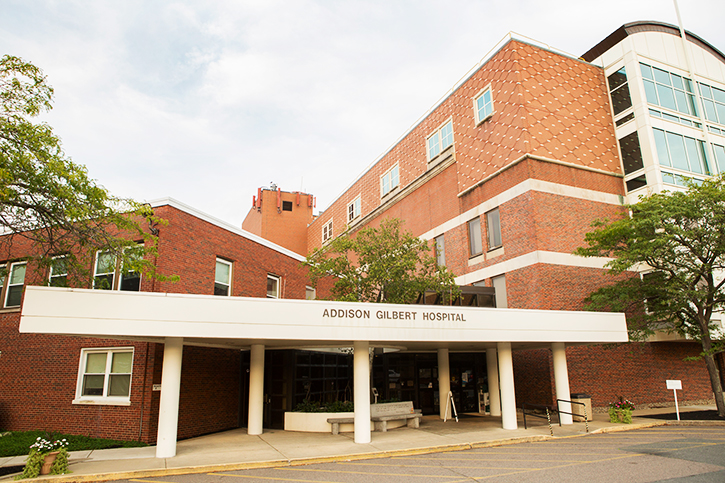
Pain Management Center at Addison Gilbert Hospital
Reduce or Manage Your Pain at the Pain Management Center
You don’t have to suffer alone if you have chronic pain. The board-certified doctors at The Pain Management Center help you manage or reduce your unresolved pain symptoms, enhance your day-to-day functions, and improve your overall quality of life.
Located at Addison Gilbert Hospital, we offer a wide range of state-of-the-art treatment options all in one, convenient location.
Conditions We Treat at the Pain Management Center
The Pain Management Center specialists care for patients with all forms of pain. Common pain conditions treated in the center include (but are not limited to):
- Acute herpes zoster/shingles — viral infection of nerve roots causing pain and a rash.
- Back, neck and musculoskeletal pain — several disorders that can produce pain in these areas are muscle strain, ligament sprain, myofascial pain, fibromyalgia among other disorders.
- Cancer pain — pain associated with malignancies.
- Carpal Tunnel Syndrome — a condition that occurs when the median nerve becomes pinched due to swelling of the nerve or tendons or both. When this nerve becomes pinched, numbness, tingling, and sometimes pain of the affected fingers and hand may occur and radiate into the forearm.
- Cervical, Thoracic, Lumbar Disc Herniations — disc between two vertebrae ruptures and puts pressure on the spinal nerves.
- Complex Regional Pain Syndromes (CRPS), formerly known as Reflex Sympathetic Dystrophy (RSD) — is a progressive disease of the Autonomic Nervous System characterized by continuous, intense pain that is out of proportion to the severity of the injury. CRPS or RSD can occur from trauma/injury to the bodyFacet Syndrome — a condition characterized by a pattern of back pain (sometimes with buttocks pain) that is generated by a unique set of joints between each vertebrae, called the facet joints. Pain from facet syndrome is often experienced in the vicinity of the inflamed joint, though occasionally the pain spreads away from the spine several inches or more, sometimes into the limbs.
- Failed back syndrome — or post-laminectomy syndrome, refers to chronic back and/or leg pain that is experienced after spinal surgery.
- Fibromyalgia — a medical disorder characterized by chronic widespread pain and a heightened, painful response to pressure in muscles and fibrous tissue especially of the back, shoulders, neck, hips, and knees.
- Headache and facial pain — Migraine, cluster, tension, sinus headaches; temporomandibular joint (TMJ)/jaw pain caused by arthritis, jaw injury, or muscle fatigue.
- Joint Pain — due to arthritic conditions. Chronic pain after total knee joint replacements.
- Neurologic pain — a sharp, shocking pain that follows the path of a nerve and is due to irritation or damage to the nerve. Causes of neuralgia include:
- Chemical irritation
- Chronic renal insufficiency
- Diabetes
- Infections, such as herpes zoster (shingles), HIV, Lyme disease, and syphilis
- Chemotherapy medications
- Medications such as cisplatin, paclitaxel, or vincristine
- Porphyria
- Pressure on nerves by nearby bones, ligaments, blood vessels, or tumors
- Post-herpetic neuralgia — localized pain in the area of involvement of shingles that persists beyond one month
- Post-amputation pain — sometimes called "phantom pain" and occurs when a limb is removed during an amputation, an individual will continue to have an internal sense of the lost limb.
- Spinal nerve pain — pain caused by spinal cord injury or damage to the nerves associated with the cervical, thoracic, lumbar, sacral and coccygeal regions of the spine.
- Vascular insufficiency — inadequate peripheral blood flow that results in pain to the area of inadequate blood flow.
- Vertebrogenic Low Back Pain — pain due to degenerative changes in the lumbar vertebral end plates.
Driving Directions & Parking Information
Planning ahead for your visit can make it easy and convenient.
From Route 128 North
Follow Route 128 North to Gloucester. At the Grant Circle Rotary, proceed three-quarters of the way around and exit at the Route 127/Annisquam sign. Follow Route 127 (Washington Street) for 0.3 miles, and the hospital will be on your left.
From Boston and the South Shore
Take Route 3 or the Expressway North to Route 93 North. Follow Route 128/95 North (exit 28A in Woburn, previously exit 37A). Follow the directions above for Route 128 North.
Once you arrive at the hospital, drive to the parking lot at the back of the building. Enter the Main Outpatient entrance. Proceed straight ahead to our Access Services Registration Area. A representative will register you for your appointment and direct you to the right department.

